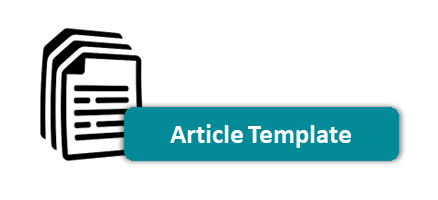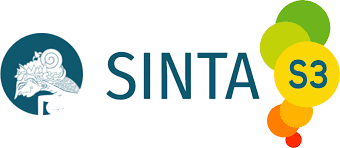PENINGKATAN IDEOLOGI ETIS MELALUI PEMBELAJARAN ETIKA BISNIS
DOI:
https://doi.org/10.24002/modus.v32i1.3193Abstract
ABSTRACT
Ethical idelogy is very important in developing attitudes of students that will become leaders in business and political institution. The way to strengthen ethical ideology of students can be done by educating them through Business and Professional Ethics. Leaders with strong ethical ideology will behave in the best interest of the organization as a whole; on the other hand leaders with weak ethical ideology will maximize their own interest in the expense of organizations’ interest. Many scholars believe that young adulsts cannot be taught ethics because they already have stable values. On the other hand so many researches found that young adults can improve their ethical values during the process of ethical trainings as well as in the process of ethical education in higher learning institution. The purpose of this research is to examine whether ethical ideology can be impoved during the process of education by following Business and Professional Ethics subject. For this purpose, the data were collected from students of Business and Professional Ethics. The result of this research shows that in the process of education, students can improve their ethical ideology significantly.
Keywords: ethics can be taught; ethics cannot be taught; ethical ideology
ABSTRAK
Ideologi etis merupakan hal yang sangat penting di dalam proses pembentukan sikap mahasiswa-mahasiswa yang merupakan calon pemimpin dalam institusi bisnis dan politik. Salah satu cara untuk meningkatkan ideologi etis mahasiswa adalah mendidik mereka melalui pembelajaran Etika Bisnis dan Profesi. Para pemimpin dengan iedologi etis yang kuat akan bertindak demi kepentingan organisasi secara keseluruhan; sebaliknya, para pemimpin dengan ideologi etis yang lemah cenderung memaksimalkan kepentingan mereka sendiri dan mengorbankan kepentingan organisasi. Banyak ahli meyakini bahwa orang-orang dewasa muda tidak dapat diberikan pendidikan etika karena mereka sudah memiliki nilai-nilai yang stabil. Namun demikian, banyak penelitian yang menemukan bahwa orang-orang dewasa muda dapat meningkatkan nilai-nilai etis mereka melalui pembelajaran di institusi pendidikan tinggi. Tujuan penelitian ini adalah untuk mengetahui apakah ideologi etis dapat ditingkatkan melalui proses pembelajaran Etika Bisnis dan Profesi. Data penelitian ini diperoleh dari para mahasiswa kelas Etika Bisnis dan Profesi. Hasil penelitian ini menunjukkan bahwa melalui proses pendidikan, para mahasiswa dapat meningkatkan ideologi etis mereka secara signifikan.
Kata kunci: etika dapat diajarkan; etika tidak dapat diajarkan; ideologi etis
References
Barker, Chris, Nancy Pistrang & Robert Elliot (2002). Research Method in Clinical Psychology. John Wiley & Sons.
Bishop, T. R. (1992). Integrating business ethics into an undergraduate curriculum. Journal of Business Ethics, 11, 291-299.
Boyd, R. Richerson P.J. (1985). Culture and evolutionary process. The University of Chicago Press. Chicago.
Cohen J.R & Bennie N.M. (2006). The applicability of a contingent factors model to accounting ethics research. Journal of Business Ethics, 68: 1 – 18.
Cragg, W. (1997). Teaching business ethics: The role of ethics in business and in business education. Journal of Business Ethics, 16, 231-245.
Emerson, T. L. N., & Conroy, S. J. (2004). Have ethical attitudes changed? An intertemporal comparison of the ethical perceptions of college students in 1985 and 2001. Journal of Business Ethics, 50, 167 -176.
Frank, G, Ofobike, E and Gradisher, S (2010) Teaching Business Ethics: A Quandary for Accounting Educators. Journal of Education for Business, 85, 132-138.
Henle, C. R. Giacalone & C. Jurkiewicz. (2005). The Role of Ethical Ideology in Workplace Deviance. Journal of Business Ethics, 56: 219 – 230.
Martell, K., & Calderon, T. (2005). Assessment in business schools: What it is, here we are, and where we need to go now. In K. Martell & T. Calderon (Eds.), Assessment of Student Learning in Business Schools: Best Practices Each Step of the Way. Tallahassee FL: Association for Institutional Research, pp. 1–22.
Piper, Thomas R, Merry C Gentile & Sharon Daloz Parks. (1993). Can Ethics be Taught?. Harvard Business School.
Sen. A. (1982). Inequality reexamined. Oxford Clarendon Press. Oxford.
Stead, B. A. & Miller, J. J. (1988). Can social awareness be increased through business school curricula. Journal of Business Ethics, 7, 553-560.
Stephens, V.R., & Stephens, A. S. (2008). An examination of accounting majors’ ethical decisions before and after an ethics course requirement. Journal of College Teaching & Learning, 5 (4) 49-55.
Velasquez, Manuel G. (2006). Business Ethics: Concepts and Cases. New Jersey. Pearson Prentice-Hall.
Weber, J (1990). Manager’s moral reasoning: Assessing their response to three moral dilemmas. Human Relations, 43:687-702.















